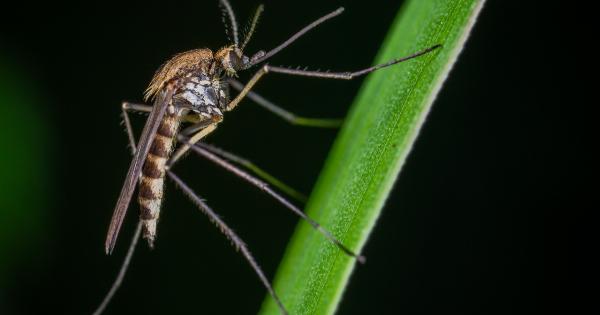Mosquitoes, the tiny flying insects known for their irritating bites, have had a longstanding relationship with humans throughout history.
These blood-sucking pests have been a constant nuisance, spreading deadly diseases and disrupting human activities in various parts of the world. However, despite their negative impact, scientists have discovered that there is an intricate evolutionary relationship between humans and mosquitoes that stretches back millions of years.
Mosquitoes: Ancient Ancestors
Mosquitoes belong to the order Diptera, which also includes flies and gnats. They have been on Earth for more than 200 million years, making them one of the oldest insects known to science.
Fossil evidence suggests that mosquitoes evolved from a group of midge-like flies during the Jurassic period, long before humans even existed.
Mosquitoes as Disease Vectors
Mosquitoes’ ability to transmit diseases to humans is one of the most significant aspects of their relationship with us. While only female mosquitoes require blood meals to produce eggs, both males and females feed on plant nectar.
However, it is the females that bite humans and other animals for blood, sometimes acting as carriers of harmful pathogens.
Throughout history, diseases like malaria, dengue fever, Zika virus, yellow fever, and West Nile virus have been transmitted to humans through mosquito bites.
These diseases have had a profound impact on human populations, causing widespread illness, death, and socio-economic disruption.
The Evolution of Mosquito-Borne Diseases
As humans evolved and spread across different regions of the world, so did mosquitoes and the diseases they carried.
It is believed that mosquitoes initially fed on the blood of reptiles, but as mammals emerged, they became susceptible to mosquito-borne diseases as well. This evolutionary interaction between mosquitoes, mammals, and eventually humans, influenced the development and spread of various diseases.
For example, malaria, caused by the Plasmodium parasite, most likely originated in African primates. As humans migrated out of Africa, they encountered different species of Anopheles mosquitoes, which became vectors for the disease.
Over time, the parasite adapted and evolved within mosquitoes and human hosts, resulting in different strains of malaria with varying levels of severity and resistance to treatment.
Human Adaptations to Mosquitoes
As mosquitoes continued to affect human populations, humans themselves evolved various adaptations to minimize the impact of mosquito-borne diseases.
One of the most well-known adaptations is sickle cell trait, a genetic condition that provides some resistance to malaria.
In regions where malaria is prevalent, individuals who carry the sickle cell trait have a survival advantage. The shape of their red blood cells, distorted from the norm, makes it difficult for the malaria parasite to invade and reproduce efficiently.
As a result, those with the sickle cell trait are more likely to survive malaria infections, passing down the genetic advantage to future generations.
Similarly, other genetic mutations, such as thalassemia and glucose-6-phosphate dehydrogenase (G6PD) deficiency, have also been associated with increased resistance to malaria.
These adaptations highlight the ongoing coevolution between humans and mosquitoes, with humans developing defenses to combat the diseases mosquitoes transmit.
Mosquito Control Methods
Across history, humans have devised numerous methods to control mosquito populations and reduce the spread of diseases.
While early methods involved physical barriers like bed nets and clothing, the development of insecticides and pesticides in the 20th century revolutionized mosquito control.
The widespread use of insecticides, such as DDT, significantly reduced mosquito populations in many parts of the world.
However, the environmental impact and the emergence of insecticide-resistant mosquitoes raised concerns, leading to the development of alternative approaches.
Today, integrated mosquito management approaches combine methods like biological control (e.g., introducing natural predators and genetically modified mosquitoes), insecticide-treated bed nets, and public awareness campaigns to target mosquito populations and minimize the risk of disease transmission.
Climate Change and Mosquito-Borne Diseases
Climate change has emerged as a significant factor influencing the geographical distribution and prevalence of mosquito-borne diseases.
Rising temperatures, altered rainfall patterns, and changes in habitat suitability can impact mosquito populations and their ability to transmit diseases.
As temperatures increase, mosquitoes may expand their ranges into higher altitudes and latitudes, exposing new populations to diseases previously unseen in those regions.
Additionally, changes in precipitation patterns can create breeding sites for mosquitoes, leading to localized outbreaks of diseases like dengue fever.
Efforts to mitigate climate change, adapt to its effects, and develop innovative strategies for mosquito control are crucial in managing the evolving threat of mosquito-borne diseases.
The Future of the Human-Mosquito Relationship
As our understanding of the complex evolutionary relationship between humans and mosquitoes deepens, scientists continue to explore novel ways to predict and prevent the spread of mosquito-borne diseases.
Advances in genetic engineering have opened doors to potential interventions like gene drives, which can alter mosquito populations by spreading genetic modifications that hinder disease transmission.
Moreover, ongoing research into mosquito behavior, mating patterns, and their interactions with pathogenic microorganisms offer insights into developing targeted interventions.
Some studies investigate disrupting the mosquitoes’ olfactory systems to make them less effective at finding human hosts, while others explore the potential of vaccines against mosquito saliva to prevent allergic reactions and disease transmission.
Though the battle against mosquito-borne diseases is ongoing, humanity’s long evolutionary history with these insects provides hope for innovative solutions that can reduce their impact on human health.





























